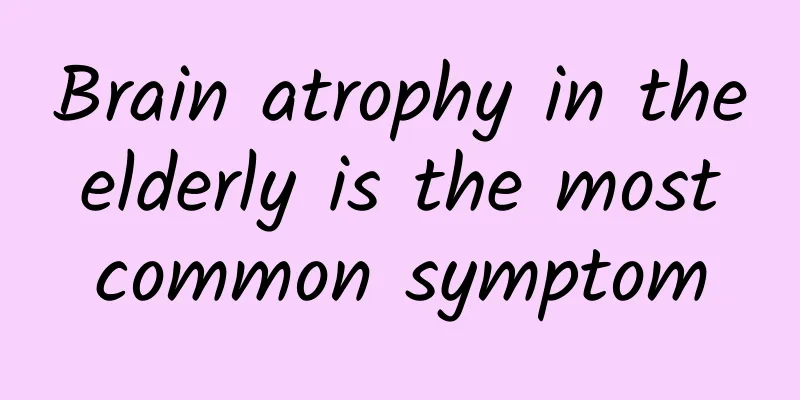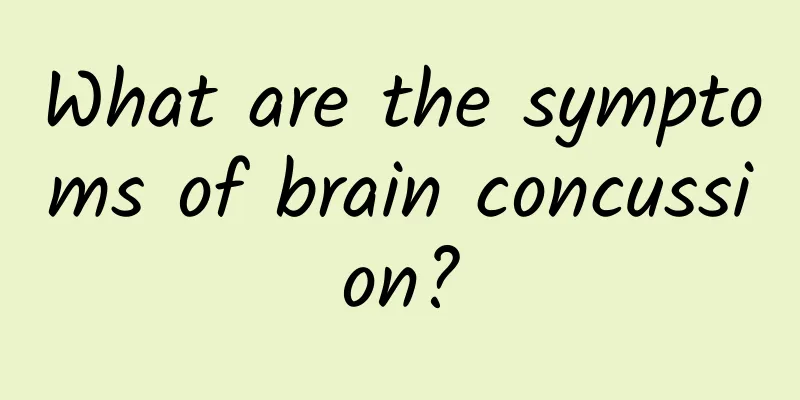Brain atrophy in the elderly is the most common symptom

|
One problem that people often face when entering old age is brain atrophy. Many elderly people have no independent consciousness, which has a great impact on their families. Brain atrophy in the elderly will significantly reduce their memory and their personality will become depressed, so family members must take good care of them. 1. Symptoms of brain atrophy in the elderly 1. Memory impairment: Recent memory impairment occurs early, such as frequently losing items, forgetting promises, etc. As the disease progresses, memory is completely lost. This is one of the symptoms of brain atrophy in the elderly. 2. Changes in personality and behavior: Personality changes are also a major symptom of senile cerebral atrophy. The patient becomes withdrawn and dislikes interacting with others, or has no ideals, desires, or lacks affection for children and relatives; living habits are rigid and strange, and the personality is irritable, the speech increases, or the words are long-winded and repetitive; or the patient is suspicious and selfish, pays special attention to his own health and safety, and is often entangled in some minor discomforts. 3. Intellectual decline and dementia: manifested by a comprehensive decline in intellectual activities such as understanding, judgment, and calculation ability, inability to adapt to social life, and difficulty in doing work and housework; gradually becoming unable to correctly answer one's own name and age, not knowing when to be hungry or full when eating, not knowing the way home after going out, and collecting waste paper and other items as treasures. In the later stages of the disease, the patient is bedridden all day, unable to take care of himself, unable to distinguish between relatives and strangers, incontinent, speaks slurred, slurred, and incoherently, eventually becoming completely demented. These are all symptoms of brain atrophy in the elderly. 2. Home Care 1. Care for cerebral atrophy should strengthen nutrition, improve nutrition, maintain dietary balance and mental health. 2. Read more books and newspapers, participate in group activities regularly, exercise moderately, enhance cognitive activities, and strive to restore previous life experience and abilities. 3. Enhance the patient's orientation. If the orientation disorder is severe, the patient should avoid going out alone. 4. Nursing for cerebral atrophy should also promote language communication and assist patients in increasing interpersonal interactions, such as participating in recreational activities and outdoor activities. 5. Properly store dangerous items, reduce the change of items in the room, ensure the safety of patients, pay attention to cleanliness and hygiene, and maintain the integrity of the patient's skin. |
>>: Symptoms of essential tremor, these manifestations are most common
Recommend
What are the effects of honeysuckle vine?
Honeysuckle is a common Chinese medicinal materia...
What are the symptoms of kidney essence deficiency and what are the traditional Chinese medicine treatments?
Perhaps male friends all know the symptoms of kid...
What diseases can be detected by leucorrhea?
Whether a woman's leucorrhea is normal or not...
What does kidney percussion pain indicate?
The kidney is the main site for stone formation i...
Treatment of heart failure
Heart failure is commonly known as heart failure....
Main efficacy of black fern
Black fern is also called pointed-leaf golden flo...
What are the characteristics of genetics?
Almost half of the people in life are very concer...
Do you need to avoid certain foods when you have urticaria?
There are many similarities and differences betwe...
Can I drink Chinese medicine without the medicine guide?
It is okay to drink Chinese medicine without the ...
Collagen oligopeptide
Collagen oligopeptide is oligopeptide collagen po...
Infant emergency symptoms and care
Pediatric emergencies are extremely harmful and h...
What are the effects and functions of Liujunzi Decoction?
When using Liujunzi Decoction, one must pay atten...
Can ulcerative colitis heal itself? How to treat it?
Ulcerative colitis has a very obvious erosive eff...
Recurrence of candidal vaginitis during ovulation
The recurrence of candidal vaginitis during ovula...
Pain at the root of the tongue in the elderly may be a hidden danger of some serious disease
Many people regard tongue pain as heat in the bod...









